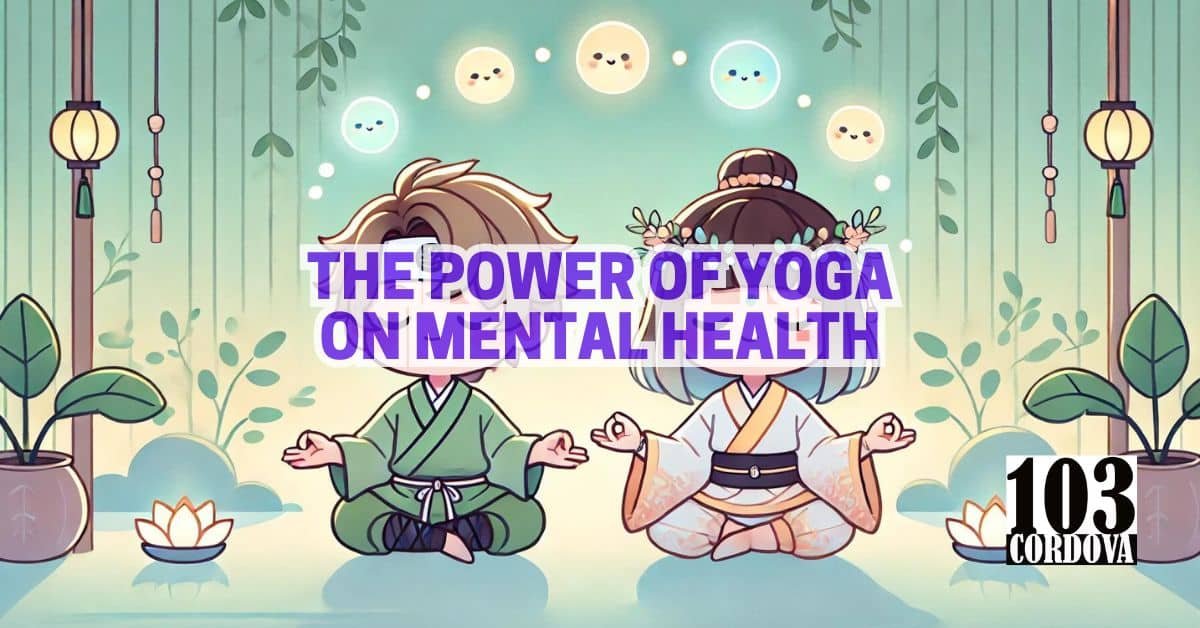Yoga on mental health is more than just physical exercise—it is a practice that strengthens the connection between the body and mind.
Through a combination of movement, breathing, and meditation, yoga helps manage stress, improve emotional balance, and promote overall well-being.
Unlike traditional workouts, yoga focuses on mindfulness and relaxation, making it a powerful tool for mental clarity and inner peace.
Studies suggest that regular practice can reduce anxiety, boost mood, and even support brain health by encouraging neuroplasticity.
By embracing yoga, individuals can cultivate resilience, enhance self-awareness, and create a lasting sense of mental stability.
1. The Brain-Body Connection: Yoga’s Holistic Approach
Yoga’s focus on the connection between the mind and body makes it a powerful tool for improving mental well-being.
By practicing any type of yoga, whether it’s Hatha, Vinyasa, or Yin, you can develop a deeper understanding of how your thoughts and emotions influence your physical state.
This awareness allows you to respond to stress and emotional challenges with greater control and ease.
For instance, yoga can help reduce tension through simple postures like Child’s Pose or Savasana, which promote deep relaxation and calm your nervous system.
Breathing techniques also play a significant role in soothing both the mind and body, further supporting emotional balance.
This holistic approach encourages the regulation of mood swings and emotional reactions, offering a natural way to maintain mental stability.
Regular practice helps create harmony between your mental and physical well-being, fostering a sense of inner peace.
🧘 Why the Standing Lotus Pose Is Tough on Both Your Body and Mind
2. How Yoga Shapes the Brain: Boosting Flexibility and Growth
Yoga helps the brain adapt and grow by supporting neuroplasticity, which is the brain’s ability to form new connections.
Regular practice can improve memory, focus, and problem-solving skills by strengthening neural pathways.
Breathing exercises and meditation in yoga increase blood flow to the brain, helping it stay healthy and function better.
Studies show that yoga may also lower stress-related brain changes, reducing anxiety and improving emotional balance.
By keeping the mind flexible and strong, yoga supports both mental clarity and long-term brain health.
🧘 Why Cork Yoga Blocks Are Better Than Foam Ones
3. Yoga for Overall Wellness: More Than Just a Workout
Yoga is often seen as just another workout, but it offers a wide range of health benefits beyond physical fitness.
Its holistic approach supports emotional balance, mental clarity, and stress management, making it a powerful tool for overall well-being.
Yoga may also enhance focus and boost mood by integrating mindful breathing with physical movement, helping to calm the mind.
This mind-body connection fosters a sense of inner stability, which is essential for coping with daily challenges.
Unlike traditional exercises that only work on the body, yoga promotes relaxation and lowers stress levels, contributing to long-term emotional health.
The consistent practice of yoga can help improve resilience, increase self-awareness, and provide psychological well-being.
The health benefits of yoga make it an excellent choice for people seeking both physical and mental wellness.
🧘 Why Mindfulness Is Key to Taking Your Yoga Practice Further
4. Yoga as a Stress Buster: Calm Your Mind, Body, and Soul
Yoga provides effective techniques for reducing stress by soothing the nervous system and calming the mind.
Specific poses, such as the forward bend or legs-up-the-wal,l are designed to release tension and promote relaxation.
Deep breathing exercises, commonly practiced in yoga, lower cortisol levels, helping to bring your body into a relaxed state.
By taking time to breathe slowly and deeply, yoga practitioners can better manage stressful situations in daily life.
This practice builds resilience, making it easier to remain calm in the face of external pressures.
🧘 Can Hatha Alignment Yoga Help Ease Chronic Pain?

5. Finding Peace Within: Yoga for Anxiety and Depression
Yoga offers a natural and supportive approach to managing anxiety and depression.
Its focus on breath control and gentle movement helps calm the mind, reducing symptoms of these conditions.
Practices like restorative yoga or Yin yoga encourage deep relaxation, which can ease anxious thoughts and uplift your mood.
The combination of mindful breathing and postures helps slow down racing thoughts, bringing a sense of peace and clarity.
For those who struggle with mental health challenges, yoga provides a safe space to release tension and connect with their inner self.
🧘 What’s Different About the Hatha Yoga Diet Compared to Other Yogic Diets?
6. Sleep Soundly with Yoga: Relaxation for Restful Nights
Incorporating yoga into your evening routine can help prepare your body and mind for a restful night’s sleep.
Certain yoga poses, such as the Reclining Bound Angle Pose or Supine Twist, relax muscles and soothe the nervous system, promoting better sleep.
Breathing exercises like alternate nostril breathing can also help quiet a restless mind, making it easier to fall asleep.
Regular yoga practice improves the quality of sleep by reducing stress hormones and fostering a deeper sense of relaxation.
Over time, it can be an effective remedy for insomnia or interrupted sleep patterns.
🧘 Can Hatha Yoga’s Principles Be Used in Everyday Life?
7. Cultivate Inner Peace: Meditation and Mindfulness in Yoga
Meditation and mindfulness are core aspects of yoga that contribute significantly to mental health.
These practices encourage you to stay present, reducing overthinking and worrying about the future or past.
Techniques such as guided meditation or body scans help quiet the mind, making it easier to connect with a sense of inner calm.
Practicing mindfulness during yoga allows you to observe your thoughts without judgment, promoting emotional balance.
By regularly integrating meditation into your yoga routine, you can build mental clarity and cultivate lasting inner peace.
🧘 How Pranayama in Hatha Yoga Pradipika Leads You to Self-Realization
8. Breathe Your Way to Better Mental Health: The Power of Pranayama
Pranayama, the practice of controlled breathing, is an essential component of yoga that directly impacts mental well-being.
It helps balance the nervous system, calming your body and mind in moments of stress or anxiety.
Techniques like deep belly breathing or alternate nostril breathing enhance oxygen flow to the brain, promoting relaxation and focus.
Pranayama can also support emotional stability by regulating breath patterns, which in turn influence your emotional state.
Consistent pranayama practice helps strengthen the connection between breath and mental health, providing a simple yet effective tool for well-being.
🧘 What Role Do Hatha Yoga Schools Have in Keeping Traditional Yoga Alive?
9. Strengthen Your Body, Soothe Your Mind: Physical Yoga for Mental Well-Being
Physical yoga practices not only strengthen your muscles but also have a soothing effect on the mind.
Movements such as Sun Salutations or Warrior Poses engage your body while promoting mental clarity and emotional balance.
As your body becomes stronger and more flexible, the act of focusing on each pose encourages mindfulness, which reduces stress and anxiety.
Yoga movements also release endorphins, often referred to as “feel-good” hormones, which naturally enhance your mood.
This dual benefit of physical and mental improvement makes yoga a powerful practice for overall well-being.
🧘 Check Out the Amazing Benefits Yoga Has for Your Body
10. Discover Your True Self: Yoga for Self-Discovery
Yoga encourages introspection, helping you to connect with your true self and understand your inner strengths and desires.
Through regular practice, you may begin to uncover deeper insights about who you are beyond external influences and distractions.
Yoga postures, breathing exercises, and meditation offer a path to greater self-awareness, helping you explore your inner world.
This self-discovery process promotes personal growth, enabling you to live more authentically and with greater purpose.
Yoga can empower you to align your actions with your core values and improve your mental health.
🧘 Expand Your Understanding of Yoga Practices
11. Bounce Back Stronger: Yoga for Resilience and Coping
Yoga fosters resilience by teaching you to remain centered and composed, even in the face of adversity.
The practice of mindful breathing and steady movements helps build emotional strength, allowing you to cope with life’s challenges more effectively.
Yoga poses that require balance and focus, such as the Tree Pose or the Eagle Pose, can enhance your ability to manage stress and recover from difficult experiences.
Practicing yoga regularly also boosts mental flexibility, making it easier to adapt to unexpected changes.
This mental resilience enables you to handle stress with greater ease and emerge stronger from hardships.
🧘 The Yoga Studio on 103 Cordova
💡 Conclusion
Yoga offers a comprehensive and holistic approach to improving mental health by focusing on both the body and mind.
Regular practice can help reduce stress, manage anxiety, and promote emotional well-being.
The combination of physical movement, breathing exercises, and mindfulness techniques creates a supportive environment for mental growth.
By embracing yoga, you can cultivate resilience, find inner peace, and strengthen your emotional stability.
The transformative effects of yoga on mental health can lead to a more balanced and fulfilling life.
🧘 Our Services
Experience the benefits of yoga with our inclusive classes for all ages, held at 103 Cordova Tower, Marquinton Residences, Cirma Street, Sto. Nino, Marikina City.
Whether you’re a beginner or a seasoned practitioner, our sessions are designed to promote physical well-being and mental clarity.
Reach out to us at 09176225780, via Facebook, or through our website’s contact form for any inquiries.
Our welcoming environment encourages relaxation, mindfulness, and personal growth.
Join us today and discover the transformative power of yoga!
🎧 Listen to the Audio Blog

